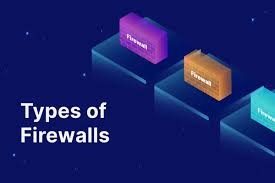As cyber attacks get increasingly complex, organisations need to understand firewalls and network security. Any network security plan must feature a powerful firewall as the first line of defense against cyber threats. In this post, we will cover the many kinds of firewalls, the importance of firewalls and network security, and how to pick the proper firewall for your organisation.
Understanding Firewalls
A firewall is established between your internal network and outside sources (such as the Internet). It is a hardware or software solution that monitors and controls in- and outgoing network traffic based on predetermined security rules to govern and prevent unauthorized access to or from private networks. Firewalls may be hardware-based, software-based, or a mix of both.
Types of Firewalls
When it comes to network security solutions, you must understand the different firewalls:
Packet-Filtering Firewalls
These firewalls are the simplest type and operate by examining the packets at the network layer. They filter based on source and destination IP addresses, port numbers and protocols to allow or deny traffic.
- Pros: Easy setup and inexpensive.
- Cons: Limited functionality; cannot analyse packet content.
Stateful Inspection Firewalls
Stateful inspection firewalls are a more advanced class of firewalls than packet-filtering firewalls.
- Pros: More secure than packet-filtering; maintains context for active sessions.
- Cons: More resource-intensive to store state information.
Levels: Circuit-Level Firewalls
The TCP handshakes and the session initiation messages are monitored by these TCP firewalls for connecting or establishing the connection.
- Pros: Low resource usage; simple to manage
- Pros: Don’t review packet content. Cons: Packet Content Inspection
Proxy Firewalls (Application-Level Gateways)
Proxy firewalls filter traffic at the application layer, serving as intermediaries between users and the internet. They may mask user IPs, adding a layer of security.
- Pros: Granular filtering; anonymity preservation of users.
- Performance: Can reduce performance; a bit more complex to configure.
Next Generation Firewalls (NGFWs)
This entails traditional firewall capacities merged with modern safety functions like intrusion prevention systems (IPS) and deep packet inspection (DPI). Unfortunately, traditional firewalls were not its solution, as they are not designed to fend off modern threats.
- Pros: Enterprise-grade protection; detection and blocking of advanced attacks.
- Pros: Reduced cost and complexity in management.
Cloud Firewalls (Firewall-as-a-Service)
Cloud-hosted, these firewalls protect cloud assets and extend coverage to on-premises devices.
- Pros: Scalable; does not require hardware; easy to access remotely.
- Cons: It relies on an internet connection for effectiveness.
The Importance of Network Security Solutions
Protecting your networks from the rising tide of cyber attacks is critical and is only possible with the proper application of network security solutions. This is where a well-configured firewall comes into play by:
- Preventing attempts to access without authorisation
- The prevention of malware infections and data breaches.
- Making sure that the products comply with regulated industries like HIPAA or GDPR.
- Giving business owners and customers assurance.
Small businesses often lack the resources for robust cybersecurity, making them prime targets for cybercriminals. Investing in a reliable firewall is a cost-effective way to strengthen their network defenses. A trustworthy firewall acts as a critical barrier, monitoring incoming and outgoing traffic, blocking unauthorized access, and helping to prevent data breaches, thus significantly enhancing their overall security posture.
Selecting the Best Firewall for Your Business
Choosing the correct firewall includes considering your unique goals, economic limits, and the size of your organisation. Here are some top solutions that suit to varied company requirements:
- Cisco Firepower 1000 Series: Suitable for small to mid-sized organisations with integrated VPN capabilities and comprehensive threat security features.
- pfSense: An open-source system that allows flexibility in setups while being cost-effective.
- SonicWall TZ Series: Offers enterprise-grade protection against ransomware with simple administration features suited for small enterprises.
- Sophos XG Firewall: Features centralised management capabilities that simplify control over multiple firewalls across locations.
- Fortinet FortiGate: Known for its high performance at competitive prices, offering extensive threat protection features.
- Barracuda CloudGen Firewall: A versatile option available as hardware or virtual appliances with strong intrusion detection capabilities.
- Palo Alto Networks PA-400 Series: Combines machine learning with next-generation features like IoT device identification for enhanced security.
- WatchGuard Firebox: Provides unified threat management with scalable options suitable for small businesses looking for comprehensive solutions.
- Perimeter 81: A fully cloud-based solution offering multilayered protection without requiring additional hardware investments.
- Firewalla: A compact hardware firewall is ideal for small networks with content filtering capabilities that enhance overall security.
Key Features to Consider
Here are a few aspects to consider while researching firewalls for your business:
- IP Intrusion Prevention System (IPS ): Identifies harmful actions in real time and blocks operations before damage may occur
- Deep Packet Analysis (DPA): Examines packet data for tighter control over traffic flow.
- Virtual Private Network (VPN): Provides secure remote access to your company network from anywhere in the globe.
- Scalability: The firewall should be scalable to prevent large updates or replacements as your company’s demands expand.
- Management: Easy-to-use interfaces or belong to a central management framework that allows for monitoring and configuration.
Conclusion
These crucial characteristics will help you pick the correct sort of company firewall that is vital for sustaining effective network firewall security. Businesses need to examine their unique requirements since there are various alternatives available, from basic packet-filtering firewalls to next-generation systems. In an age when companies are more reliant on technology, a successful firewall is not simply a layer of protection but also a tool that promotes efficiency by permitting only valid traffic, thereby enabling organisations to concentrate on essential tasks without interruption to their services.















